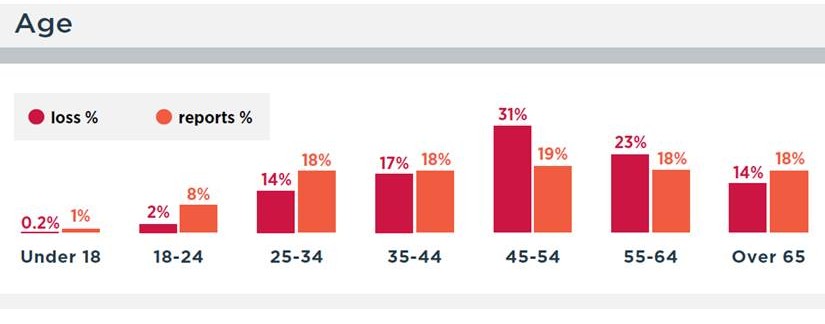The ACCC’s data shows that people aged 45 and over are disproportionately vulnerable to romance scams: those aged 65 and over have the highest rate of “conversion” after being contacted by a fraudster, at 55 per cent. I discuss some reasons why I think this is so.
I know I promised to do more on the book Cyber Love’s Illusions: the Healing Journey, but I have been distracted by preparing to move and doing some speaking engagements with the Yarra Plenty Regional Library network in north eastern Melbourne. This series of talks was organised as part of Seniors Week, and is my story of being caught in a romance scam, what happened, how I came through this, and how to be aware of the dangers. I’m also asked to cover all the different sorts of scams that people are experiencing.
As part of the discussions in my talk, I’ve been asked several times about why seniors are more susceptible. The first question to as is “Is it true that they are more susceptible?”. The Targeting Scams: report of the ACCC on scams activity 20141 reveals that the age group 55 and over accounts for 37% of those impacted by all sorts of scams, and 24% of the reported losses.
 The latest statistics for this year so far clarify that Singles aged 45 and over comprise 65% of reported dating scams. The numbers that go unreported are unknown, but it is felt that these reported figures are just the tip of the iceberg… Delia Rickard2, deputy chair of the Australian Competition and Consumer Commission (ACCC), estimates that that number represents only 10 per cent of the true levels, as reporting rates are very low. There is also little difference between men and women, they both get caught in scams.
The latest statistics for this year so far clarify that Singles aged 45 and over comprise 65% of reported dating scams. The numbers that go unreported are unknown, but it is felt that these reported figures are just the tip of the iceberg… Delia Rickard2, deputy chair of the Australian Competition and Consumer Commission (ACCC), estimates that that number represents only 10 per cent of the true levels, as reporting rates are very low. There is also little difference between men and women, they both get caught in scams.
My ideas about why this group is more susceptible include:
- Sometimes less experience with technology/computers/devices, and so not so clear on the risks and the precautions one should take. This was not my problem – I have worked in the computer industry since 1984. But I was still a victim to a scam.
- Knowledge of how to safely use social media. Dr. Cassandra Cross comments to the Joint Committee into Cyber Safety for Seniors3 that
Many seniors do not have an adequate knowledge of security
settings on accounts, either about their existence in the first place,
or the importance of changing the default setting. They believe
that only their contacts can access the information that is being
posted. In reality, this is not the case.
This means they are unaware of the dangers and may be allowing information about themselves to be visible to others. They also may not be protecting themselves against viruses, identity fraud and other dangers.
- Thirdly, as they (and I) had not previously considered online dating, they may have not been aware of the warnings being made. With so much information bombarding us, we just filter out what is not relevant at the time. As well, the Dating site
 report card from the ACCC indicates that only 48% of websites prominently display warnings, and only 23% display warnings which meet the industry standards. With this the case it is doubly likely that they have not seen the warnings.
report card from the ACCC indicates that only 48% of websites prominently display warnings, and only 23% display warnings which meet the industry standards. With this the case it is doubly likely that they have not seen the warnings. - Perhaps it is also a generational thing. The values we were taught as we grew up were very much that you did not lie, and you told the truth. It is hard for us baby-boomers and older to realise that some people are not doing this. We trust people. Perhaps not so much now-a-days, but we grew up not locking our houses. I think this carries through to all our relationships, especially when they, the fraudster, says they are looking for someone open and honest because they have been hurt in the past. We are vulnerable to believing this.
- Its also likely that the older age group is targeted specifically with an expectation that at their time in life they will have more money, and more disposable money. My experience is that fraudsters are targeting older people, though not not exclusively so. I have also met younger people who have been scammed.
- Delia Rickard, in the SMH article again, combines this with the possibility that older people are more lonely…
it’s because older people tend to have more money “and they’re often at a lonely stage of life. The people we’re seeing tend to have been through a divorce or been widowed, or their kids have left home. They’re lonely and they want to believe it more”.
The isolation of the older and elderly populations is a topic in its own right, but its becoming clearer that our desire for friendship, intimacy, companionship and sex do not diminish. This may lead us to try the ‘new way’ of connecting, on line. I believe scammers also target those newly going on to online dating sites, before they have become aware of tall of the dangers
In my talk I quote Jane Juska, who wrote her memoir of how, as a 67 year old, she put an add in the Wanted column in The New York Review of Books that went like this: “Before I turn 67 – next March – I would like to have a lot of sex with a man I like. If you want to talk first, Trollope works for me.” And it worked: she found men to play with, some to blame, some to drive her nuts, to make her laugh and sometimes cry. So she wrote a book about it called A Round-Heeled Woman: My Late-Life Adventures in Sex and Romance. I love her quote:
Love is a tyrant, isn’t it? It keeps you in thrall, it makes you do things you would never do in your right mind, go places you don’t especially want to go. It screws up your thinking, not to mention your stomach.
But I am getting off track. The ACCC’s data shows that although people aged 45 and over are less likely to fall victim to fraud overall, they are disproportionately vulnerable to romance scams: those aged 65 and over have the highest rate of “conversion” after being contacted by a fraudster, at 55 per cent. People aged 45 and over comprise more than 80 per cent of victims in romance scams.
 Of course with all this focus on the seniors I do not want to imply that they are stupid. We also need to take account of the fact that if they have been caught in a scam they have been manipulated and groomed by professional fraudsters who know what works and who set about creating an emotional state so they can abuse our/my better nature all for the sake of the money they make from it.
Of course with all this focus on the seniors I do not want to imply that they are stupid. We also need to take account of the fact that if they have been caught in a scam they have been manipulated and groomed by professional fraudsters who know what works and who set about creating an emotional state so they can abuse our/my better nature all for the sake of the money they make from it.
Footnotes:
1. Targeting Scams:report of the ACCC on scams activity 2014 https://www.accc.gov.au/publications/targeting-scams-report-on-scam-activity/targeting-scams-report-of-the-accc-on-scam-activity-2014
2. Delia Rickard, quoted in the Sydney Morning Herald,How Dating Scams Target Older People, Julia May, October 3, 2014 http://www.smh.com.au/national/how-dating-scams-target-older-people-20141002-10p4ft.html#ixzz3oOk9rqxv
3. Cybersafety for Seniors: A Worthwhile Journey Second Interim Report Joint Select Committee on Cyber-Safety March 2013, Page 37. http://www.aph.gov.au/parliamentary_business/committees/house_of_representatives_committees?url=jscc/senior_australians/report/fullreport.pdf

